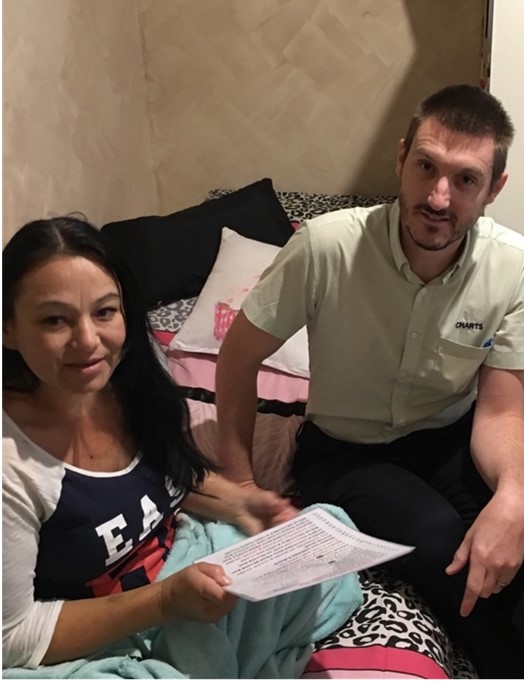Modules


An introduction to peritoneal dialysis for non-renal healthcare professionals (The HOME Network)
Components
- Introduction
- The function of the kidneys
- Treatment options for end-stage kidney disease
- The peritoneal membrane
- How peritoneal dialysis (PD) works
- Types of PD
- Infectious complications: peritonitis
- Infectious complications: exit site infection
- Other complications of PD
- Assessment
- Summary
Learning OUTCOMES
- State the basic functions of the kidney
- Describe the structure of the peritoneal membrane
- Understand the concepts of diffusion, osmosis and ultrafiltration as they relate to PD
- Identify and manage complications of PD, including peritonitis and exit site infection
Target audiences
Healthcare professionals who work in areas other than renal care, including Specialists, General practitioners, Nurses/midwives, Nurse/midwife practitioners, pharmacistsModule duration
~ 30 min
Location(s)
International

Sponsored by:

Mental health care in the CF setting for hospital and community-based health professionals – 1-hour CPD activity for GPs
Components
- Part 1: Biopsychosocial factors affecting mental health and wellbeing in CF
- Part 2: Guideline recommendations for mental health care in CF
- Part 3: Multidisciplinary mental health care in practice
Please note: This module is also available on EMPOWERED for hospital and community-based health professionals who are not GPs. Participants may NOT claim for CPD points for both activities.
Learning outcomes
- Explain the unique biopsychosocial factors that affect the wellbeing of those with CF and their caregivers across different life stages
- Employ effective strategies to engage those living with CF in the promotion of mental health and wellbeing
- Implement evidence-based interventions and referral pathways to deliver best practice mental health care to the CF population
- Collaborate with a CF specialist team and other health providers in the planning and delivery of mental health care to the CF population
- Identify resources for further learning and understanding of CF as a disease
Target audiences
General practitioners, as well as other hospital and community-based health professionals, who work outside of the specialist CF care team, and may tasked with supporting the mental health and wellness of patients and caregivers living with CF.Module duration
~1 hour
CPD
Self-reported activity
Location(s)
Australia, New Zealand


Endorsed By:

Mental health in cystic fibrosis series: Chapter 1 – The impact of CF on mental health and the impact of mental health conditions on CF
Components
- Part 1: Improved longevity in CF and its implications for mental health
- Part 2: Prevalence of mental health conditions in people living with CF
- Part 3: Understanding and identifying mental health issues in people with CF at different life stages
- Part 4: Effects of mental health conditions in CF on carers
Learning OUTCOMES
- Describe the impact of CF on mental health and the prevalence of mental health conditions in CF populations
- Explain the impact of mental health conditions on self-care, general health, functioning and quality of life for people with CF
- Differentiate between the various psychosocial risk factors and challenges faced by people with CF at each stage of life
- Explain the mental health care needs of people with CF at each stage of life
- Describe the impact of CF on the mental health of carers.
Target audiences
Specialists, advanced trainees, registrars, general practitioners, nurses and nurse practitioners, dietitians, physiotherapists, social workers, psychologists, and all members of the multidisciplinary CF care teamModule duration
1 hour
Location(s)
Australia, New Zealand


Endorsed by:

Mental health in cystic fibrosis series: Chapter 2 – Multidisciplinary mental healthcare and resources for CF
Components
- Part 1: The mental health guidelines in CF
- Part 2: Implementing mental health care – the collaborative model
- Part 3: Mental Health Care in Practice -a response framework for all CF team members
Learning OUTCOMES
- Differentiate and discuss the consensus statement principles developed by the International Committee on Mental Health in Cystic Fibrosis
- Describe the models of collaborative care and quality improvement in the context of developing a mental health program within a CF centre
- Navigate the mental health services and resources available for patients with CF
- Coordinate and work within a multidisciplinary team to achieve effective mental health care of patients with CF throughout their lifespan
Target audiences
Specialists, advanced trainees, registrars, general practitioners, nurses and nurse practitioners, dietitians, physiotherapists, social workers, psychologists, and all members of the multidisciplinary CF care teamModule duration
1 hour
Location(s)
Australia, New Zealand


Endorsed by:

Mental health in cystic fibrosis series: Chapter 3 – Personalising and prioritising mental health care in CF
Components
There are 3 fictional case studies to complete:- Pre-birth diagnosis – setting the stage for care through life
- Adolescent patient – coping with developmental, life and care transitions
- Adult CF patient – balancing the personal and developmental needs of adult life when living with CF.
Learning OUTCOMES
- Utilise effective psychological first aid and communication techniques when discussing psychosocial issues with individuals with CF, as appropriate to their developmental and/or life stage
- Initiate a mental health referral pathway for individuals with CF displaying mental health concerns
- Interpret scores for the PHQ-9 and GAD-7 screening tools for depression and anxiety, within the context of an individual with CF’s mental health presentation
- Provide appropriate psychosocial monitoring and support to individuals with CF as part of a multidisciplinary approach to mental health care.
Target audiences
Specialists, advanced trainees, registrars, general practitioners, nurses and nurse practitioners, dietitians, physiotherapists, social workers, psychologists, and all members of the multidisciplinary CF care teamModule duration
~1.5 hours
Location(s)
Australia, New Zealand


Endorsed by:

Mental health in cystic fibrosis series: Chapter 4 – Mental health of caregivers in CF
Components
- Part 1: Psychological impacts of caring for people living with CF
- Part 2: Let’s revisit Sophie
- Part 3: Practicalities of screening mental health and supporting caregivers in the CF setting
- Part 4: Supporting Sophie’s caregivers
Learning OUTCOMES
- Describe the mental health impacts of providing care and/or support to people living with CF
- Understand how to assess for and recognise mental health concerns in carers and loved ones of people living with CF
- Assess, plan and implement mental health care interventions for caregivers of people living with CF, relevant to life-stage and based on evidence-based guidelines
- Identify and describe sustainable multidisciplinary mental health services and strategies relevant for caregivers of people living with CF.
Target audiences
Specialists, advanced trainees, registrars, general practitioners, nurses and nurse practitioners, dietitians, physiotherapists, social workers, psychologists, and all members of the multidisciplinary CF care teamModule duration
~1 hour
Location(s)
Australia, New Zealand


Mental health in cystic fibrosis series: Mental health and wellbeing of HCPs working in CF
Components
- Part 1: Screening tools for quality of life, work engagement and mental health for HCPs working in CF
- Part 2: Improving mental health and wellbeing for HCPs working in CF
- Part 3: Additional support and resources
Learning OUTCOMES
- Describe the mental health impacts of working in the complex field of CF, including providing healthcare to patients with CF and family support for caregivers and loved ones
- Understand how to recognise and assess for mental health concerns within yourself and/or in other health professionals in your CF team
- Assess, plan and implement mental health and wellbeing interventions for yourself, both individually and within the CF team
- Identify when to evaluate your own mental health using mental health screening tools.
Target audiences
Specialists, advanced trainees, registrars, general practitioners, nurses and nurse practitioners, dietitians, physiotherapists, social workers, psychologists, and all members of the multidisciplinary CF care teamModule duration
~1 hour
Location(s)
Australia, New Zealand


Mental health in cystic fibrosis series: Mental health care in the CF setting for hospital and community-based health professionals
Components
- Part 1: Biopsychosocial factors affecting mental health and wellbeing in CF
- Part 2: Guideline recommendations for mental health care in CF
- Part 3: Multidisciplinary mental health care in practice
Learning outcomes
- Explain the unique biopsychosocial factors that affect the wellbeing of those with CF and their caregivers across different life stages
- Employ effective strategies to engage those living with CF in the promotion of mental health and wellbeing
- Implement evidence-based interventions and referral pathways to deliver best practice mental health care to the CF population
- Collaborate with a CF specialist team and other health providers in the planning and delivery of mental health care to the CF population
- Identify resources for further learning and understanding of CF as a disease
Target audiences
Hospital and community-based health professionals who work outside of the specialist CF care team, who may tasked with supporting the mental health and wellness of patients and caregivers living with CF. This includes psychiatrists, general practitioners, psychologists, social workers, and other members of the broader shared care team.Module duration
~1 hour
Location(s)
Australia, New Zealand